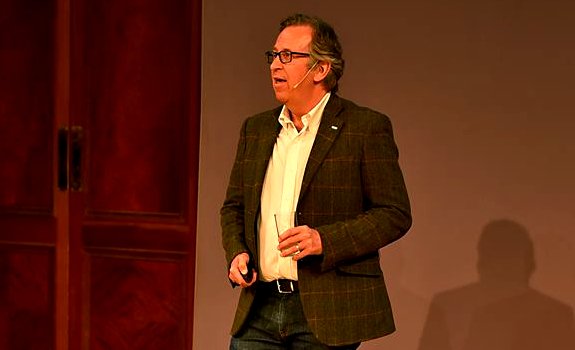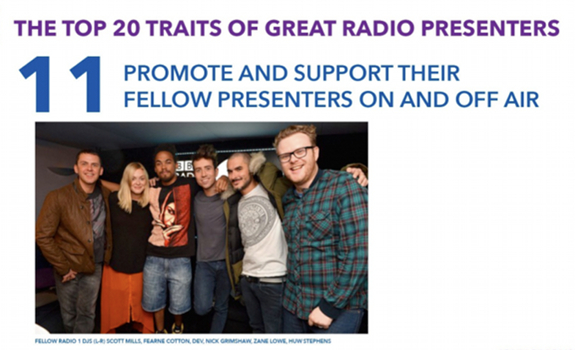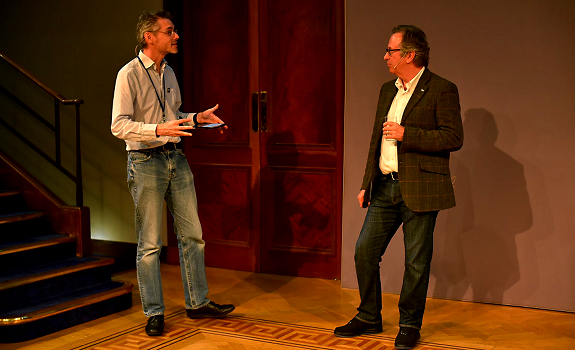If you’re a radio personality wanting to play at the top of your game, you want to check out radio consultant John Simons’ Top 20 traits of successful radio presenters.
Next Radio 2015 featured many countdowns and Top 5 charts. John Simons topped them with no less than 20 qualities of successful radio presenters. It goes to show that the world’s leading radio personalities all have a positive attitude, and great discipline. They also communicate visually, and share compelling stories. “You’ve got to have something to say.”
“It doesn’t mean you have to be a saint”

John Simons thinks you can say a lot, as long as you consciously think about how you say it (photo: Next Radio)
- Control stress and moods, and be reliable during a crisis
“The Mrs. isn’t speaking to you, the car won’t start, but the right light comes on and everything in your world is rosy. You don’t bring stress into the studio; you leave it at the studio door.”
- Be well read, but don’t pretend what you aren’t
“It’s important to know what’s going on in the world; what’s going on in your community, but if you’re false; if you pretend, you get caught out.”
- Listen to the rest of the radio station
“There was a station, where I was working as a presenter. I didn’t really like it, and had to force myself to listen to other shows, but it’s necessary. You need to know what’s going on at your station.”
- Pre-read (and then re-read) scripts before putting it on the air
“I have an old rule: read it in your head; read it out aloud; then read it on the air. Then you have a good chance of getting it right.”
- Don’t be racist, sexist or bigoted on the air
“It doesn’t mean you have to be a saint. But you do have to exist in an environment that is politically correct. You’ve got to be aware of that, and be conscious of how you say what you want to say.”
“They’ll be ten times stronger”

Team spirit and positive mood within a station is a huge part of success in radio (slide: John Simons Consulting)
- Prepare your program before, and do your paperwork afterwards
“In the 1980s, we used to do all our PRS and everything during the show. It’s a pretty dumb thing, really. You should concentrate on what you’re going to say. Competition winners, promotions, things you have to do for the commercial team… you sort it all out when you come off the air.”
- Be always hometown proud
“I’m proud where I’m from. I’m sure everyone is; you’re proud of your roots. It’s really important that you’re hometown proud on the air. When you move to another city, and you start broadcasting there, that becomes your hometown. Become proud with the city you’re broadcasting from.”
- Laugh at yourself, and often do
“Self-deprecation is one of the greatest things that you have as a presenter. The more you laugh at yourself, the more the audience will laugh at you, and the more they’ll laugh with you as well. The more laughter in the studio, the more the listeners will enjoy what you do, and you’re entertaining.”
- Be well turned out, and always on time
“We are in showbiz, [radio] is a branch of showbiz. When you’re out, if you’re seeing people; members of the community, listeners, if you’re doing some work with the sales team, make sure you look the part.”
- Promote and support your fellow presenters on & off the air
“The first day Grimmy took over the breakfast show on BBC Radio 1, all other jocks turned out on the show, early in the morning, to support him. That says so much about the spirit at Radio 1 now. If you can get your presenters to play as a team, they’ll be ten times stronger, and strong teams win.”
“A team is not just the on-air team”

Radio personalities should not just hang out & get along with fellow jocks and the PD (slide: John Simons Consulting)
- Be always out in the community
“It’s really important that you get out there, whenever there’s something big going on in your town or city, where you need to find out what it’s all about. Get out there, and make sure that the public knows that you’re out there as well.”
- Be friends with the sales department
“Most of the stations that I worked on, used to put the programming floor on the bottom, and put the sales on the next floor – and they never used to mix. A team is not just the on-air team; it’s the whole radio station. When I was in talk radio in the 90s, everything was on one floor, and the kitchen was right in the middle. People used to mix, talk and come up with ideas.”
- Be keen to learn new skills
“The technology in a radio studio is phenomenal. There’s more screens in there than you know what to do with, so it’s important that you know what everything does, and that you learn and keep learning. You don’t just ‘show and go’. The days of turning up at 5 minutes before the show and pulling out of the car park during the news jingle for the next guy are gone.”
- Share (some of) your life with your listeners
“Howard Stern is renown as being this ‘outrageous shock jock’, but actually, if you do listen to Howard, he does something outrageous every 5 to 6 weeks to get a bit of press coverage. Most of the time, he just talks about what’s going on in his life. Everyone knows: when they come into contact with Howard, it could end up on the air. Make sure that your family and friends are aware of this. I always used to say: don’t tell me something if you don’t want to hear it on the radio tomorrow! Presenters who share their lives with their listeners, become close to their listeners; one of their best friends.”
- Paint pictures with your links
“The most difficult thing to do in radio is sports commentary; football commentary in particular – 22 players on the field; you’re trying to communicate where the ball is, and how they’re all doing. If you can bring the traits of a great sports commentator, it brings everything to life. The pictures on radio are better than the pictures on TV, because they’re in the listener’s head.”
“Doing videos is so important”

James Cridland and John Simons agree that social & visual are a part of today’s personality radio (photo: Next Radio)
- Know your audience, and live their life
“Watch the television shows that your listeners are watching. The new James Bond movie that’s coming out in a few weeks, whether you like it or not, go and see it. Do the things that your audience does. I’m not absolutely certain that Steve Wright does this, but he certainly comes across as if he knows exactly what his listeners are bothered about at the moment.”
- Use social media effectively to stay relevant to your audience
“Facebook, Twitter, YouTube, Instagram, Snapchat – whatever the latest thing is, you’ve got to be aware of it; you’ve got to be involved in it. But Facebook is still king. If you’re not doing stuff on Facebook effectively, you’re not doing your job right these days. You’ve got to be involved in social media. Doing videos along with stuff you do in the studio is so important.”
- Talk to one person, not the audience
“Don’t say ‘hello listeners’, because we talk one-to-one. It’s a very personal – probably the most personal relationship – because you’re talking straight into someone’s head; straight into their brain.”
- Listen to [airchecks] of your own show regularly
“Listen back to your own show, every day. Listen to what you do. You’ll identify those verbal crutches that keep coming up in conversation; you’ll identify all sorts of things – before the PD does, when he does a snoop session with you…”
- Have something to say, and don’t be afraid to say it
“You should always have something to say; that’s what radio’s all about. When I say: don’t be afraid to say it, I don’t mean: be outrageous, ridiculous, use profane language, or anything like it. You’ve got to know what the regulations are, but you’ve got to have something to say.”





Howdy, Pard… before my show Friday, I spent several hours reviewing my playlist, hoping (to ensure) nothing would go wrong… well, it was late afternoon and 90F inside my mobile studio, and – things DID go wrong with system (almost complete failure)…
I always keep minimum of two backups (computers, phone, MP3 player, CD player, wiring/connectors, etc., and when time came for our national (US) anthem as we kicked off the show, someone in the back of truck said, “Don’t screw this up when you get the que!”. I avoided a disaster by being prepared and by having an extra plan – just in case!
Thnx for all the reports. I don’t get to them every week or as often as I’d like; however, they ARE quite useful.
Thnx for your support.
J. Shelburne
KMPC 710 (re-birth in 2008 of an old 50s-70s LA station, for car shows in northern Utah)
Hi Ron! Thank you for taking the time and effort to write this motivating comment. Really appreciate it! I’m glad you enjoy the site, and I’m wishing you all the best for your own personality radio endeavours!
Thank you for taking the time and effort to share this valuable information. Not only is it just new information, but a good number of common sense reminders of solid principles of radio as well. Again thanks to the utmost.
Regards,
Ron Edwards